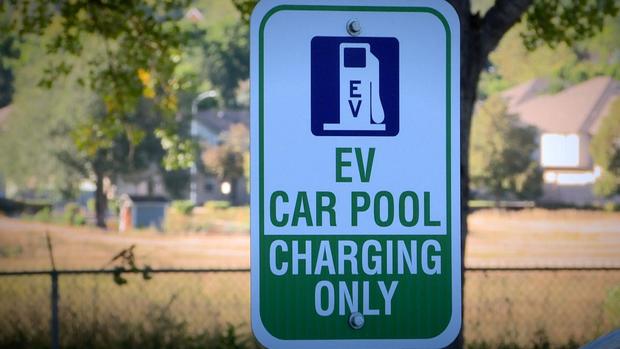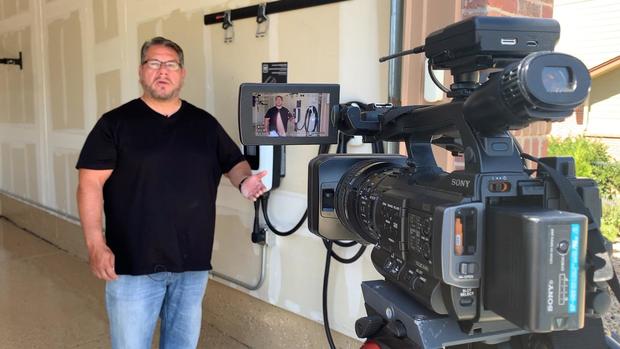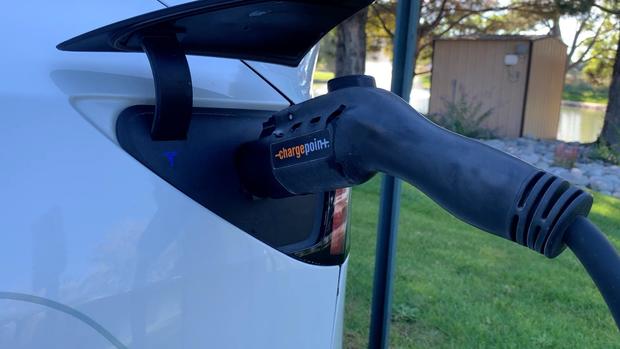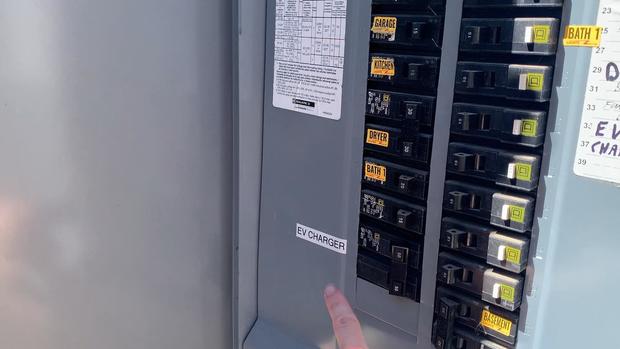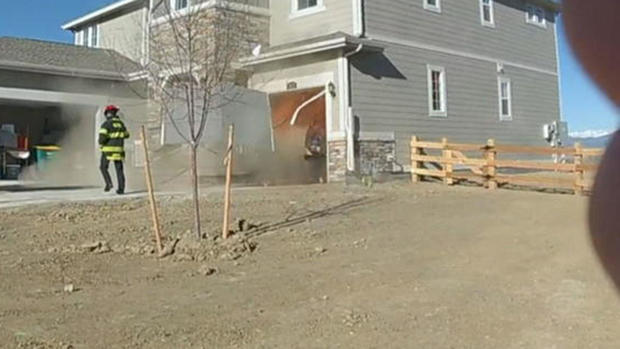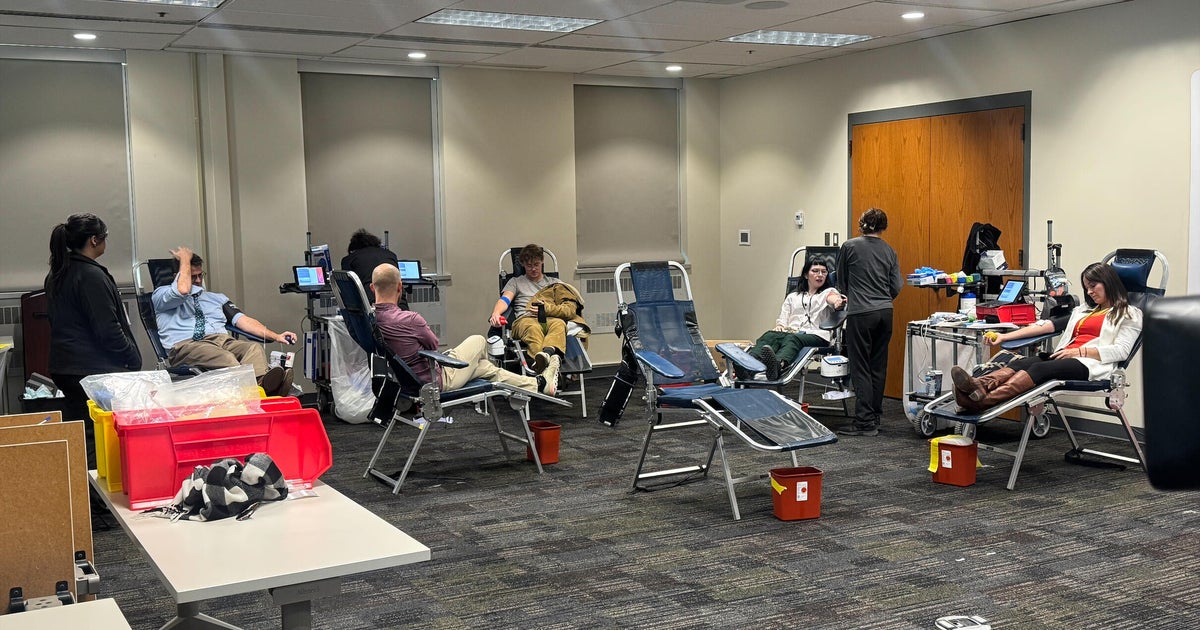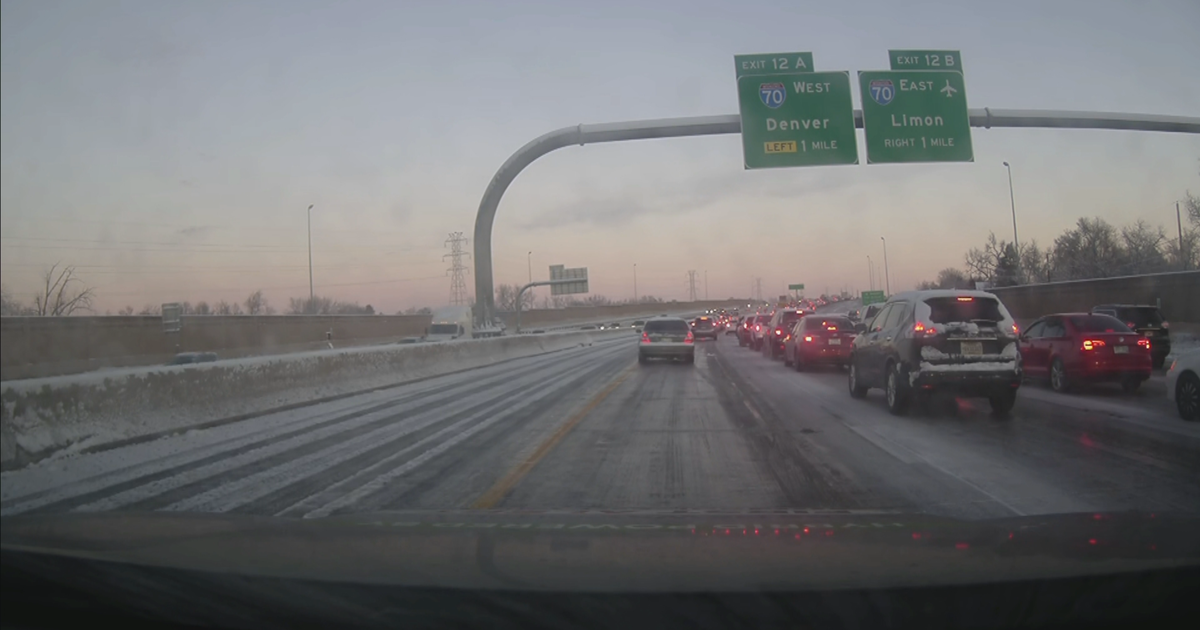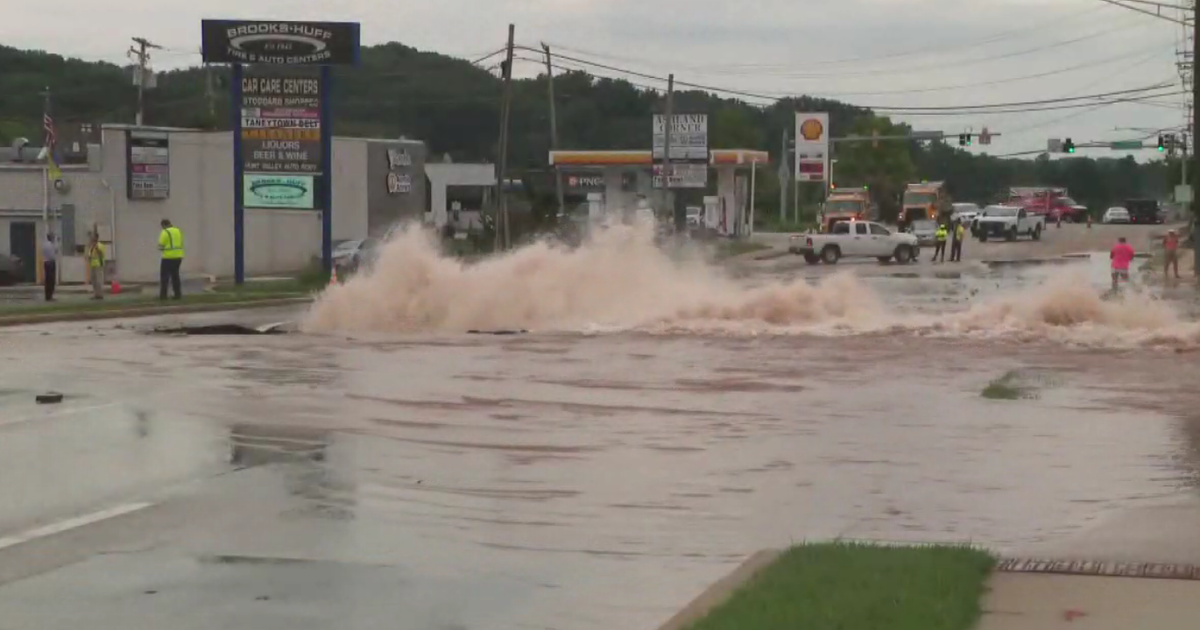Many Colorado homes and power grids aren't ready for more electric vehicle charging. Here's what experts say needs to be done.
With hundreds of thousands more electric vehicles expected on Colorado highways in the next few years, CBS News Colorado has learned many power grids aren't yet ready to handle the added power demands to charge those vehicles.
One expert tells us upgrading power grids in time for the state's goal of 940,000 electric vehicles by 2030 will be "challenging, to say the least."
Electrician Rory Berumen, who is also the Executive Director of the National Electrical Contractor's Association's Rocky Mountain Chapter, has a front-row seat to long-term planning conversations to update Colorado's electric infrastructure to meet the needs of more EVs charging in homes and businesses.
"To make sure we can perform all these works with the deadlines that have been provided, it's going to be challenging, to say the least, and there's going to be a lot of work that's going to need to take place to ensure that we can do that," he said. "So, I think some of the goals are very lofty... we're in meetings, and they're very contested from both sides through there, but I know at least from our standpoint, we're just trying to make sure we've got properly trained people in place that can do the work."
He says right now, many of Colorado's older electric grids aren't built to handle the power demands of EV charging, so hypothetically, if suddenly everyone in one of those neighborhoods had an EV charging at once, that could cause black outs.
Or, he says, a more likely possibility would be that the demand might eventually cause some customers to have to sacrifice other electric luxuries.
"You can have outages," Berumen said. "Or it's called a brown out, like you read like in California where they're putting right now these meters up on all the homes where people can't turn on the air conditioning at certain times, it'll be the same thing."
But with many drivers on wait lists for some EVs and many other drivers worried about the potential mileage range these vehicles can offer, not everyone will be switching to electric overnight. Berumen says those factors will help buy some time for power companies to make changes before black or brown outs become a problem.
However, he says supply chain and manpower challenges will still create big obstacles for critical grid improvements.
"I've got to tell you to make sure right now (there's a need to secure more) transformers. You can't get enough transformers. Some of them are on two year waits, so, they can build them right now, but if we can't get all the parts, all the equipment and everything to put them in, it's going to create some lag time," Berumen said. "I think those are two big issues. It's going to be supply chain demand, and it's going to be manpower shortages that are going to really hold us up if we can make these dates or not."
Power companies say they're preparing: "Proactive distribution system planning is so critical"
Executives at the Tri-State Generation and Transmission Association agree that grid updates are going to be critical over the next 10 even 20 years.
"There is definitely going to be a requirement to manage the distribution grids better, and that's something that we've been working on for the last couple of years is that how do you control EV charging," says Tri-State's Chief Energy Innovations Officer Reg Rudolph. "What we're trying to work on is developing and designing programs that control that demand so that we can balance the the existing infrastructure and with demand response, and controlling chargers, and so forth, so that we don't have to make those infrastructure investments probably as fast as we would have otherwise."
As a co-op, Tri-State sells power to electric companies across Colorado. Rudolph says they're working with their members to help install new charging infrastructure in rural areas.
"One of the biggest challenges with electric vehicles is the public infrastructure, and the infrastructure at the residential level," Rudolph said. "We're working with our member systems and their end US consumers to provide rebates to evaluate different technologies. What are the best chargers that can be used? On the public infrastructure charging aspect of it, how do you build a regional network? And a lot of the challenges that we face is that anywhere between 50 and 100 miles is where you're going going to need a DC fast charger and a lot of times in the rural areas, there isn't that electrical infrastructure to meet those needs."
Xcel Energy also says it's working proactively on the challenges ahead.
"That's definitely on our radar, and that's where I think this proactive distribution system planning is so critical," said Nadia El Mallakh, the Vice President of Clean Transportation and Strategic Partnerships for Xcel.
She says while there is some time before everyone makes the switch, "it's clearly picking up pace."
So, she says Xcel is spending $50 million on what she calls "no regrets" investments to trucking corridor grids.
"These are areas where we've looked at the system, and we've looked at light, and medium, and heavy duty trucking, particularly also along corridors, and where there's a lot of density to say, 'okay, what are some upgrades we can make now that are no regrets, and so that the grid can be more ready when these heavier duty EVs come onto the road,'" El Mallakh said. "The great thing is as businesses transition those vehicles over, we see significant carbon emission reductions, but sometimes those can take longer times, because they can trigger more grid upgrades. So, we're really excited to be doing this."
El Mallakh also says Xcel is working on advanced metering technology that will help inform other grid update decisions. Read more about those plans by clicking here.
"We can more quickly see and isolate where an outage is, what's caused it, and how quickly, even sometimes remotely, can repair it. This is going to be really important for EVs in the future," she said. "We're planning right now on being able to to determine where we're seeing high levels of EVs, and that's going to help us with prioritization of proactive system upgrades."
Experts also tell CBS News Colorado that changes at a state legislative level will need to be made, including items like financial supports, streamlining permitting processes, and incentivizing the expansion of the electrician workforce.
"I think a big key piece is making sure the regulators and the legislators support us, being able to make proactive distribution system investments that are efficient and wise and really leveraging our customer programs to reward our customers to say, 'hey, if you charge off peak, that's great for the grid, it's great for your pocketbook, and that helps us do efficient grid upgrades,' so, that we're not over building, but we're not under building," El Mallakh said.
Many individual homeowners will also need to update their electric systems to accommodate the power demands of EV charging. Here's some expert advice to consider.
Berumen says while industries figure out major grid fixes to accommodate new EV technology, there may also be some important electric upgrades your own home will need if you're wanting to hop on the EV train.
If your home is an older home with a lower amp panel, he says you'll need to hire an expert to determine if you should replace your panel to a 200 amp panel that can handle higher power. That's an upgrade that could cost up to $4,000.
"If you have a 60 amp or smaller panel, you're probably going to need to upgrade your service," Berumen said. "New homes are going to have maybe 200 amp services. There's going to be a lot of homes out there with 100 amp service, that doesn't mean that you're going to have to replace the panel, but a load calculation should be done (before installing an EV charger)."
He also says it will be important to keep in mind where your electric panel is located and if special wiring will need to be installed to ensure your charger can sit in the most convenient place for your at-home parking.
"If your panel is already in the garage, your installation might cost a lot less, so that's why I'd recommend you get an electrician to come out, so you can plan your costs and nothing surprises you," Berumen said.
El Mallakh with Xcel says her company is offering rebates to customers to help offset some of the costs of installing a new EV charger.
If you're interested in evaluating some rebate and incentive programs for EVs, click here to see Xcel's rebate programs for residents, and here for commercial businesses.
Right now, power companies say it's better on the grid to charge your electric vehicle overnight, when there's less demand from other appliances on the power grid, but that can come with safety risks if something is wrong with your car's lithium ion battery.
There was an explosion at a garage in Erie when a vehicle's lithium battery was smoking, and firefighters applied water to it.
Firefighters recommend drivers should be around when you charge your EV, in case something goes wrong, so you can call 911.
So what should you do? Charge overnight to avoid stressing the grid, or charge during the day when you're awake to be able to keep an eye on things?
Berumen says there's a good compromise: charge overnight, but set the charging at a lower power level so it charges more slowly and safely.
"I only use 80% of the capacity that I'm supposed to be using to charge," he explained. "So, I think we have a 50 amp breaker in there, I'm using well under that. In a lot of the new cars you can set that in your car, and you can set up the charge time, so they actually stop and start at certain times, as well."
"All hands on deck" effort required moving forward
Bottom line, experts tell CBS News Colorado EVs are an environmentally friendly, fun-to-drive way of the future that will also ultimately be more cost effective for consumers than gas-powered vehicles, but they say it's important for homeowners, power companies, and state leaders alike to do some homework before we can get to 940,000 EVs in Colorado by 2030.
"With a growing number of charging stations popping up nationwide, electric vehicles are becoming an increasingly attractive option for many drivers," Berumen said.
He says the need to upgrade infrastructure on a small scale in private homes and businesses, and on a larger scale for public power grids, has made it a great time to consider becoming an electrician.
"There is a lot of work, and we're going to need to get a lot of people trained to do the work," he said.
Some experts in the industry say to ensure public infrastructure is adequately updated by 2030, it will require an "all hands on deck" and "can do" approach.
"I think there's been a lot of good progress on things like codes and making sure that when we're building new buildings and homes that we're integrating this into it, you know whether it's EV ready or other electrification forms ready that helps, and then really coordinating with the utility on that, so, I think making sure that there's support for early and often coordination, making sure that there are mechanisms for utilities to lean in and be proactive and invest smartly and wisely," she said. "It's a whole system, so, distribution is critical... we want to think about the whole system holistically, and integrate this all."
